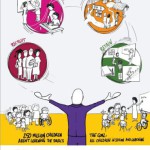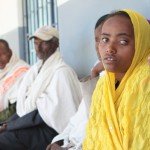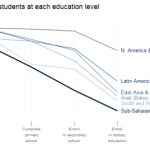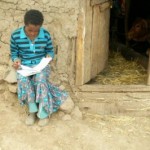During a trip to Ethiopia with the Norwich-based Selamta Family Project last month, Sandra Soho and her two daughters were doing the program’s work, participating in the lives of families sponsored by the nonprofit organization.
One evening during the trip, Soho’s younger daughter, Anni, 14, came to her with a question: “Why can’t we be more like people here,” Soho said, recalling the conversation. “They’re so friendly, they’re so warm and welcoming.”
The Selamta Family Project’s stated purpose is to bring some of Ethiopia’s 5 million children orphaned by the AIDS epidemic into a new family structure. Children are brought from the orphanages or off the street and are resettled in homes with Selamta “mothers,” older women who are trained as caregivers. The program considers the children, who all live in the same neighborhood, an extended family.
But Selamta is also an educational organization. Under its auspices, the 129 children that have been brought intothe project attend a private school that continues through the equivalent of junior college.
The project has also had a profound effect on the 100 or so Upper Valley students who have volunteered to travel to Ethiopia. The lesson, Soho said, might best be called “cultural humility,” or “the understanding that our way isn’t always the best way.”
In many cases, the experience of visiting the Selamta family,which lives in 11 homes in a larger neighborhood of Addis Ababa, the Ethiopian capital, throws the lives of American students into sharp relief.
Katie Soho, 16, said her first visit, when she was in eighth grade, “was a major culture shock.”
But part of that shock was recognizing aspects of her own culture. “It’s great to see how much material things don’t really matter,” she said.
The start of the current school year has been the best so far for her two daughters, Sandra Soho said. They take pride in having gone to Ethiopia, and are taking their own schooling seriously.
Katie Soho, now a junior at Windsor High School, said the time she spent with Selamta last month has focused her attention on school. Education is a scarce resource in Ethiopia. “I’ve just taken advantage of what I have now,” Katie said.
Student volunteers have to outline a project for their time in Addis Ababa. Most will teach. English, art and dance are all popular subjects, as are games like soccer.
Teaching exposes the American students to the thirst for education among the Selamta children. For example, Hanover native Sasha Kahan spent the summer before college in Ethiopia, where she worked with children who were unhappy if they didn’t have school.
“The kids the summer I went were really disappointed because they didn’t have summer school,” said Kahan, who is now a 19-year-old Dartmouth College junior. Children would ask, “We have tutoring today, right? When’s the next one?”
Jamie Mesler, a 17-year-old Hartford High School senior, said she feels much more motivated in school since her return from Ethiopia. “I want to go back and share my education with these kids,” she said, expressing a sentiment that runs counter to the usual argument in favor of education — earning power.
Often there is a vast gulf between learning about a new culture in the classroom and experiencing it in person.
“In school, they try to explain a culture to you and people can interpret it in their own way,” Katie Soho said. “Going over there, you get to experience it instead of just reading about it.”
With Selamta, that means getting a taste of Amharic, the primary language in Ethiopia. The gap between Amharic and English, for which there is no precise transliteration, meant Selamta participants often communicated through pantomime, Kahan said.
Kahan is a member of Selamta’s newly founded junior board, all of whom went to Hanover High School. Students have volunteered from Thetford, Windsor, Hartford and Lebanon, as well as from the towns that attend Hanover High.
Selamta founder Carol Stone said education is central to the organization’s mission.
“One of our goals is, in a country of 50 percent unemployment, we want our kids to be able to get a job,” Stone said. And because the children often come to Selamta from the streets, “they bring with them a tremendous amount of knowledge about how to improve their country.”
Upper Valley students have had a surprising impact in Ethiopia, Stone said, and have returned home transformed by their experiences.
“Their lives have changed because they have so much,” Stone said. “They really understand how much they’ve been given in the country. … These young people, it’s like their hearts have changed.”
The Money Challenge
For the past few years, 30 percent inflation in Ethiopia has put pressure on the Selamta Family Project’s budget. Where the organization once paid $75 a month for each of the 11 homes it rents for families of orphaned children, the figure has climbed to $250 a month, said Carol Stone, the organization’s founder.
Stone is hitting the pavement to raise more money. Literally. She plans to walk 129 miles this fall, a mile for each of the children in Selamta’s care. Her walk starts Friday, with a walk from Dan and Whit’s in Norwich to Harpoon Brewery in Windsor, and Saturday, from King Arthur Flour in Norwich to Gillingham’s store in Woodstock. The following weekends Stone will walk in Connecticut and Maine, where Selamta has supporters.
On Oct. 12, Selamta’s many volunteers will hold a 5-kilometer run to share the end of Stone’s walk. For more information or to donate, go to Selamta’s website, www.selamtafamilyproject.org.
Alex Hanson, Valley News Staff Writer






![International adoption: I was stolen from my family by Tarikuwa Lemma [CNN]](https://www.ethiopianopinion.com/wp-content/uploads/2013/09/ethiopian21-150x150.jpg)













![Police in Addis Ababa arrested Ethiopian woman for wearing fake butt pads [Satire] Police in Addis Ababa arrested Ethiopian woman for wearing fake butt pads [Satire]](https://www.ethiopianopinion.com/wp-content/plugins/top-10/timthumb/timthumb.php?src=http%3A%2F%2Fwww.ethiopianopinion.com%2Fwp-content%2Fuploads%2F2014%2F04%2FUnknown-150x150.jpg&w=&h=&zc=1&q=75)








Join Conversations